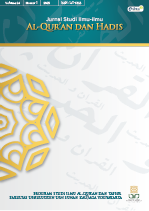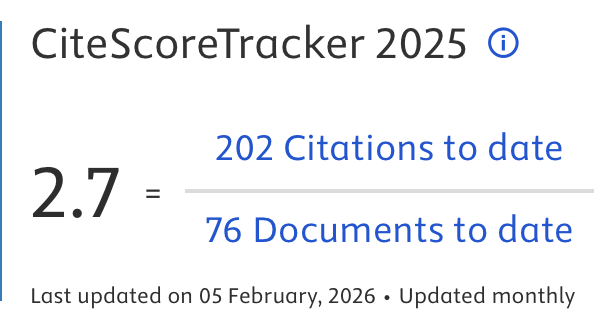Paradigm Shifts in Gender Narratives of Tafsīr al-Ibrīz through Oral Exegesis on Youtube
DOI:
https://doi.org/10.14421/qh.v25i1.5416Keywords:
Oral Exegesis, Gender, Shifting Paradigm, Online Media, PesantrenAbstract
This article examines the book Tafsīr al-Ibrīz, written by KH Bisri Mustofa, a prominent Javanese exegesis. The book has been re-read and interpreted orally by his son, Gus Mus (KH Ahmad Mustofa Bisri), on his YouTube channel. This study highlights a new tradition in the digital era where Qur'anic exegesis is transmitted and transformed through both written texts and oral interpretations. This research employs a qualitative approach, using primary data from the official YouTube Channel of Gus Mus and secondary data from relevant scholarly literature. Document analysis and descriptive-analytic methods reveal a significant paradigm shift between the written and oral exegesis. Specifically, gender issues such as polygamy and women's leadership, which are presented with a gender-biased perspective in the written Tafsīr al-Ibrīz, are reinterpreted by Gus Mus with a focus on gender equality. This transformation is influenced by the socio-cultural context, Gus Mus's educational background, and the changing audience of the oral exegesis. The study incorporates gender equality theory, highlighting forms of gender inequality like marginalization, subordination, stereotyping, violence, and double burden. The findings suggest that Gus Mus's oral exegesis reflects an egalitarian interpretation, contrasting with the traditional views in Tafsīr al-Ibrīz, thus promoting fair treatment for both women and men. This research contributes to the discourse on gender and Qur'anic exegesis by demonstrating the dynamic nature of oral interpretation in the Indonesian pesantren context and its impact on advancing gender equality in Islamic thought.
References
Adib, Cholidul. “KH Bisri Mustofa.” ahlussunahwaljamaah, May 2, 2007. Accessed January 8, 2024. https://ahlussunahwaljamaah.wordpress.com/manakib/kh-bisri-mustofa/.
Al-Ayya, Arina. “Konstruksi Relasi Gender Dalam Tafsir Al-Qur’an (Telaah Kitab Nazharat Fi Kitabillah Karya Zainab al-Ghazali al-Jubaili).” Prosiding Konferensi Gender dan Gerakan Sosial 1, no. 01 (December 26, 2022): 574–586.
Baydi, Ubaidillah. “Decoding the Cultural Significance of Pengaosan Tafsir Al-Ibriz in Kedawung, Mojo, Kediri: An Analysis of Social Meanings.” Jurnal Studi Ilmu-Ilmu al-Qur’an dan Hadis 24, no. 1 (January 2023).
Bruinessen, Martin van. Kitab Kuning, Pesantren Dan Tarekat. Translated by Farid Wajidi and Rika Iffati. 1st ed. 1 1. Yogyakarta, Indonesia: Gading Publishing, 2012.
Dozan, Wely, and Supriadi Supriadi. “Peran Perempuan Dalam Meningkatkan Tarap Bekerja Terhadap Keluarga: Kajian Isu Gender Dalam Perspektif Al-Qur’an.” AL-WARDAH: Jurnal Kajian Perempuan, Gender dan Agama 15, no. 2 (December 27, 2021): 167–179.
Esack, Farid. Quran, Liberation and Pluralism: An Islamic Perspective of Interreligious Solidarity against Oppression. England: Oneworld, 1997.
Fakih, Mansour. Analisis Gender & Transformasi Sosial. Yogyakarta: Pustaka Pelajar, 2012.
al-Farmawy, Abd al-Hayy. Abd Al-Hayy al-Farmawi.1976. Al-Bidayah Fi al-Tafsir al-Maudhu’i. Mesir: Dirasah Manhajiyyah Mawdluiyyah, 1976.
Fauzi, Taufiqurrahman, and Mohammad Ruslan. “Tinjauan Al-Qur’an Terhadap Kesetaraan Gender Dalam Pembagian Warisan.” El-Furqania : Jurnal Ushuluddin dan Ilmu-Ilmu Keislaman 8, no. 02 (August 22, 2022): 22–46.
Firdayanti, Novia, Triono Ali Mustofa, and Nur Saadah Hamisan Khair. “Gender Equality in the Perspective of the Qur’an.” 142–148. Atlantis Press, 2023. Accessed December 3, 2023. https://www.atlantis-press.com/proceedings/icims-23/125991738.
Gadamer, Hans-Georg. Philosophical Hermeneutics. Translated by David E. Linge. London: University of California, 2008.
Görke, Andreas, Johanna Pink, and Institute of Ismaili Studies, eds. Tafsīr and Islamic Intellectual History: Exploring the Boundaries of a Genre. Qur’anic studies series. Oxford: Oxford University Press in association with the Institute of Ismaili Studies, 2014.
Gracia, Jorge J. E. A Theory of Textuality: The Logic and Epistemology. Albany: State University of New York Press, 1995.
gusmus. “Ini Tiga Bentuk Berpolitik Menurut Gus Mus.” Accessed May 1, 2024. http://gusmus.net/news/ini-tiga-bentuk-berpolitik-menurut-gus-mus.
———. “Profil.” Accessed January 8, 2024. http://gusmus.net/profil.
Hamka, Hamka. “SOSIOLOGI PENGETAHUAN: TELAAH ATAS PEMIKIRAN KARL MANNHEIM.” Scolae: Journal of Pedagogy 3, no. 1 (June 6, 2020): 76–84.
HS, Muh Alwi. “Tafsir Tulis Dan Lisan M. Quraish Shihab Tentang QS. Al-Qalam Dalam Tafsir Al-Misbah (Analisis Ciri Kilisanan Aditif Alih-Alih Subordinatif).” Jurnal Ilmu Ushuluddin Vol.18, no. No. 1 (2019).
Iksan, and Predi M. Pratama. “DASAR-DASAR AJARAN ISLAM, AL- QUR’AN DAN KESETARAAN GENDER.” Jurnal Syntax Fusion 1, no. 07 (July 27, 2021): 125–140.
Irsad, Muhammad. “STUDI AYAT-AYAT TENTANG MEMILIH PEMIMPIN NON-MUSLIM PERSPEKTIF MUFASIR INDONESIA.” Nurani: Jurnal Kajian Syari’ah dan Masyarakat 17, no. 2 (2017): 199–218.
Kodir, Faqihuddin Abdul. Qirā’ah mubādalah. Cetakan IV. Banguntapan, Yogyakarta: IRCiSoD, 2021.
Latifah, Umi. “Tafsir Lisan Dan Sensasi Keagamaan Muslim Urban: Studi Tentang Pengajian Tafsir Syatori Abdur Rauf.” UIN Sunan Kalijaga, 2021.
Liqok, Farri Chatul. “Al-Ibriz Dan Tafsir Lisan KH. Haris Sodaqoh.” UIN Sunan Kalijaga, 2020.
Mannheim, Karl. Ideology and Utopia An Introduction to the Sociology of Knowledge. Translated by Louis Wirth and Shils. 1st ed. London: Routledge & Kegan Paul Ltd., 1954.
Millati, Halya. “THE RECONSTRUCTION OF KAIDAH AL-TAZKÎR AND AL-TA’NÎS IN PARADIGM OF GENDER EQUALITY INTERPRETATION.” Jurnal At-Tibyan: Jurnal Ilmu Alqur’an dan Tafsir 5, no. 2 (December 11, 2020): 259–280.
Miranti, Miranti, Desma Enawati, and Novia Lestari. “Wanita Dalam Perspektif Al-Qur’an.” Jurnal Multidisiplin Indonesia 2, no. 6 (June 27, 2023): 1321–1329.
Mubasirun, Mubasirun. “Values of Tepo Seliro in Bakri Syahid’s Tafsīr al-Hudā and Bisri Mustofa’sTafsīr al-Ibrīz.” Indonesian Journal of Islam and Muslim Societies 11, no. 2 (December 8, 2021).
Muhammad, Husein. Islam Agama Ramah Perempuan. 1st ed. Yogyakarta: IRCiSoD, 2021.
Muhammad, Husein, and Faqihuddin Abdul Kodir. Fiqh perempuan: refleksi kiai atas wacana agama dan gender. Cet. IV. Yogyakarta: LKIS, 2007.
Muhsin, Imam. “BUDAYA PESISIRAN DAN PEDALAMAN DALAM TAFSIR AL-QUR’AN (Studi Kasus Tafsir al-Ibrīz Dan Tafsir al-Huda).” Thaqafiyyat : Jurnal Bahasa, Peradaban dan Informasi Islam 15, no. 1 (February 6, 2016): 1–21.
Mursyid, Achmad Yafik. “Paradigma Penelitian Manuskrip Al-Qur’an: Dari Diskursus Ke Metodologi”. Islamika : Jurnal Ilmu-Ilmu Keislaman 21, no. 02 (January 25, 2022): 77–95.
Mustaqim, Abdul. “MODEL PENELITIAN TOKOH (Dalam Teori Dan Aplikasi).” Jurnal Studi Ilmu-ilmu Al-Qur’an dan Hadis 15, no. 2 (2014): 201–218.
———. “The Epistemology of Javanese Qur’anic Exegesis: A Study of Ṣāliḥ Darat’s Fayḍ al-Raḥmān.” Al-Jami’ah: Journal of Islamic Studies 55, no. 2 (December 15, 2017): 357–390.
Mustofa, Bisri. Al Ibriz Versi Latin (Tafsir Al-Quran Bahasa Jawa). Depok: Lembaga Kajian Strategis Indonesia, 2013.
———. Al-Ibrīz Li Ma’rifati Tafsīr al-Qur’ān al-‘Azīz. Vol. 1. Kudus: Menara Kudus, n.d.
———. Al-Ibrīz Li Ma’rifati Tafsīr al-Qur’ān al-‘Azīz. Vol. 4. Kudus: Menara Kudus, n.d.
Muttaqin, Ahmad. “Women’s Identity in the Digital Islam Age: Social Media, New Religious Authority, and Gender Bias.” QIJIS (Qudus International Journal of Islamic Studies) 8, no. 2 (December 31, 2020): 253–388.
Ong, Walter J., and John Hartley. Orality and Literacy: The Technologizing of the Word. 30th anniversary ed.; 3rd ed. Orality and literary. London ; New York: Routledge, 2012.
Qudsy, Saifuddin Zuhri. “Pesantren Online: Pergeseran Otoritas Keagamaan Di Dunia Maya.” Living Islam: Journal of Islamic Discourses 2, no. 2 (November 24, 2019): 169–187.
Qudsy, Saifuddin Zuhri, and Althaf Husein Muzakky. “Dinamika Ngaji Online Dalam Tagar Gus Baha: Studi Living Qur’an Di Media Sosial.” POROS ONIM: Jurnal Sosial Keagamaan 2, no. 1 (June 29, 2021): 1–19.
Rahmatullah, Rahmatullah. “Menakar Hermeneutika Fusion of Horizons H.G. Gadamer Dalam Pengembangan Tafsir Maqasid Alquran.” Nun: Jurnal Studi Alquran dan Tafsir di Nusantara 3, no. 2 (2017): 149–168.
Rofiah, Nur. Nalar Kritis Muslimah: Refleksi Atas Keperempuanan, Kemanusiaan, Dan Keislaman. Bandung: Afkaruna.id, 2020.
Rohmaniyah, Inayah. Menyoal Keadilan Dalam Poligami. Yogyakarta: PSW UIN Sunan Kalijaga, 2009.
Rustam, Nurcholish, and JUbair Situmorang. “Memahami Perbedaan Gender Dalam Perspektif Islam Dan Socio-Kultural”.” AL-WARDAH: Jurnal Kajian Perempuan, Gender dan Agama 14, no. 1 (September 29, 2020): 29–43.
Sa’adah, Siti, and Neng Hannah. “The Role of Women in the Public Domain in the View of the Qur’an.” Gunung Djati Conference Series 4 (April 27, 2021): 586–595.
Saeed, Abdullah. Interpreting the Qurʼān: Towards a Contemporary Approach. Abingdon [England] ; New York: Routledge, 2006.
Sofwani, M. Irfan. Mengenal Tulisan Arab Melayu. Yogyakarta: Adicita Karya Nusa, 2005.
Umar, Nasaruddin. Argumen Kesetaraan Gender: Perspektif Al-Qur’an. Jakarta: Paramadina, 2001.
Wasik, Abdul. “INTERPRETATION OF THE QUR’AN IN A FEMINIST PERSPECTIVE: (The Thought of Asma Barlas and His Contribution to the Development of Islamic Law).” International Conference on Humanity Education and Society (ICHES) 2, no. 1 (March 29, 2023). Accessed December 3, 2023. http://proceedingsiches.com/index.php/ojs/article/view/16.
Yani Yuliani, S. Ag. “TAFSIR LISAN ONLINE KAJIAN TERHADAP PENGAJIAN TAFSIR AL-QUR’AN BUYA SYAKUR DI YOUTUBE.” Masters, UIN SUNAN KALIJAGA YOGYAKARTA, 2022. Accessed May 9, 2024. https://digilib.uin-suka.ac.id/id/eprint/53532/.
Yuskaev, T. Raufovich. “The Quran Comes to America: Pedagogies of Muslim Collective Memory.” The University of North Carolina, 2010.
Tafsir Al-Ibriz - Surat an-Nisa’ : 3 | KH. A. Mustofa Bisri, 2022. Accessed April 1, 2024. https://www.youtube.com/watch?v=dGBl-znoDrU.
Tafsir Al-Ibriz - Surat an-Nisa’ : 34 | KH. A. Mustofa Bisri, 2022. Accessed May 2, 2024. https://www.youtube.com/watch?v=5KKVRoAuVQ4.
“GusMus Channel - YouTube.” Accessed December 1, 2023. https://www.youtube.com/.
“KH Bisri Musthofa: Singa Podium Pejuang Kemerdekaan.” NU Online. Accessed May 1, 2024. https://www.nu.or.id/tokoh/kh-bisri-musthofa-singa-podium-pejuang-kemerdekaan-LWdYe.
“Search Result - KBBI VI Daring.” Accessed May 1, 2024. https://kbbi.kemdikbud.go.id/entri/pegon.
Downloads
Published
Issue
Section
License
Copyright (c) 2024 Muhammad Irsad, Abdul Mustaqim, Saifuddin Zuhri Qudsy

This work is licensed under a Creative Commons Attribution-NonCommercial-NoDerivatives 4.0 International License.
Publishing your paper with Jurnal Studi Ilmu-ilmu al-Qur'an dan Hadis means that the author or authors retain the copyright in the paper. Jurnal Studi Ilmu-ilmu al-Qur'an dan Hadis uses license CC-BY-NC-ND or an equivalent license as the optimal license for the publication, distribution, use, and reuse of scholarly works. This license permits anyone to copy and redistribute the material in any medium or format and must give appropriate credit, provide a link to the license, and indicate if changes were made. If you remix, translate, transform or build upon the material you may use it for private use only and not for distribution. Jurnal Studi Ilmu-ilmu al-Qur'an dan Hadis granted an exclusive non-commercial reuse license by the author(s), but the author(s) are able to put the paper onto a website, distribute it to colleagues, give it to students, use it in your thesis, etc, so long as the use is not directed at a commercial advantage or toward private monetary gain. The author(s) can reuse the figures and tables and other information contained in their paper published by Jurnal Studi Ilmu-ilmu al-Qur'an dan Hadis in future papers or work without having to ask anyone for permission, provided that the figures, tables, or other information that is included in the new paper or work properly references the published paper as the source of the figures, tables or other information, and the new paper or work is not direct at a private monetary gain or commercial advantage.
Jurnal Studi Ilmu-ilmu al-Qur'an dan Hadis journal Open Acces articles are distrubuted under the Creative Commons Attribution-NonCommercial-NoDerivatives 4.0 International (CC BY-NC-ND 4.0). Article can be read, copy and redistribute the material ini any medium or format under the following conditions:
Attribution — You must give appropriate credit, provide a link to the license, and indicate if changes were made. You may do so in any reasonable manner, but not in any way that suggests the licensor endorses you or your use.
NonCommercial — You may not use the material for commercial purposes.
NoDerivatives — If you remix, transform, or build upon the material, you may not distribute the modified material.











